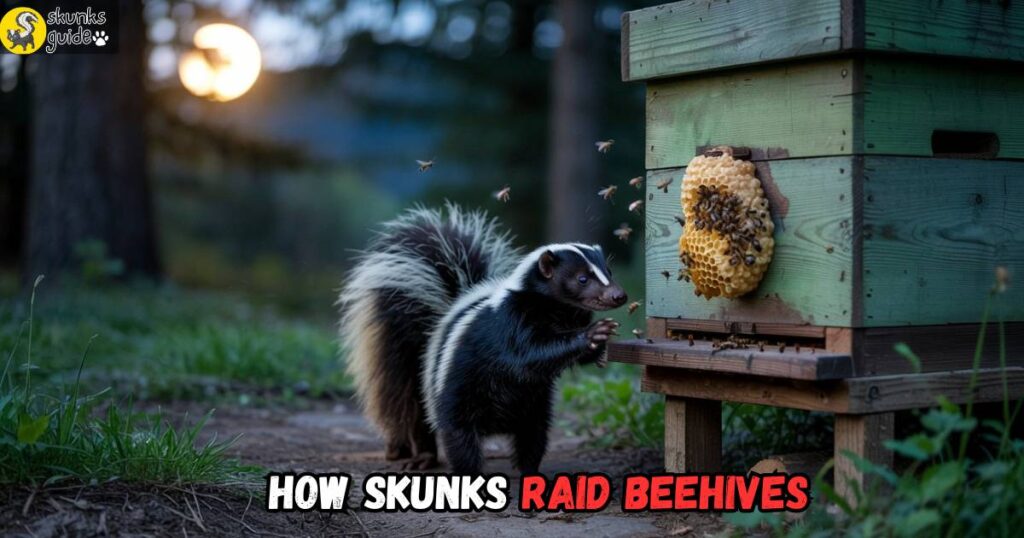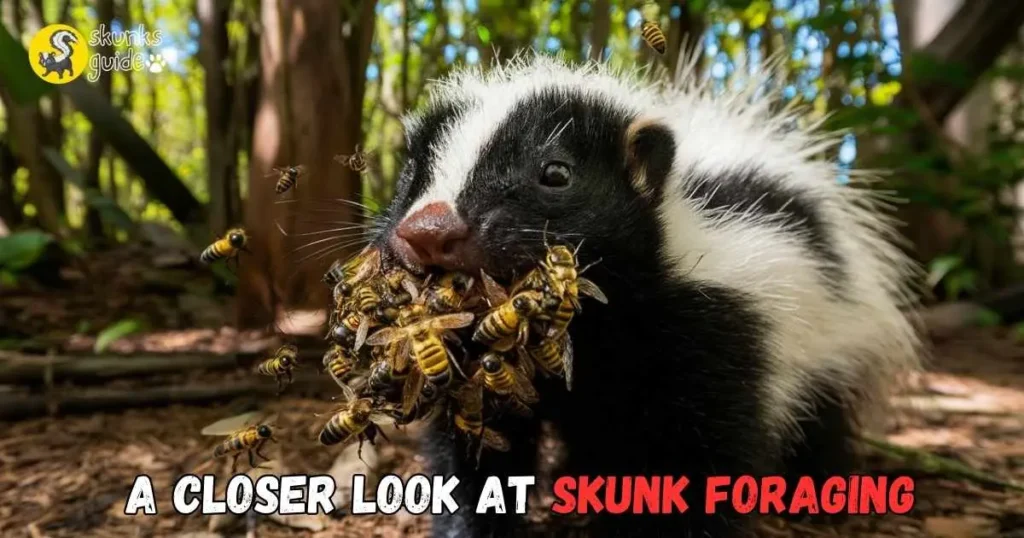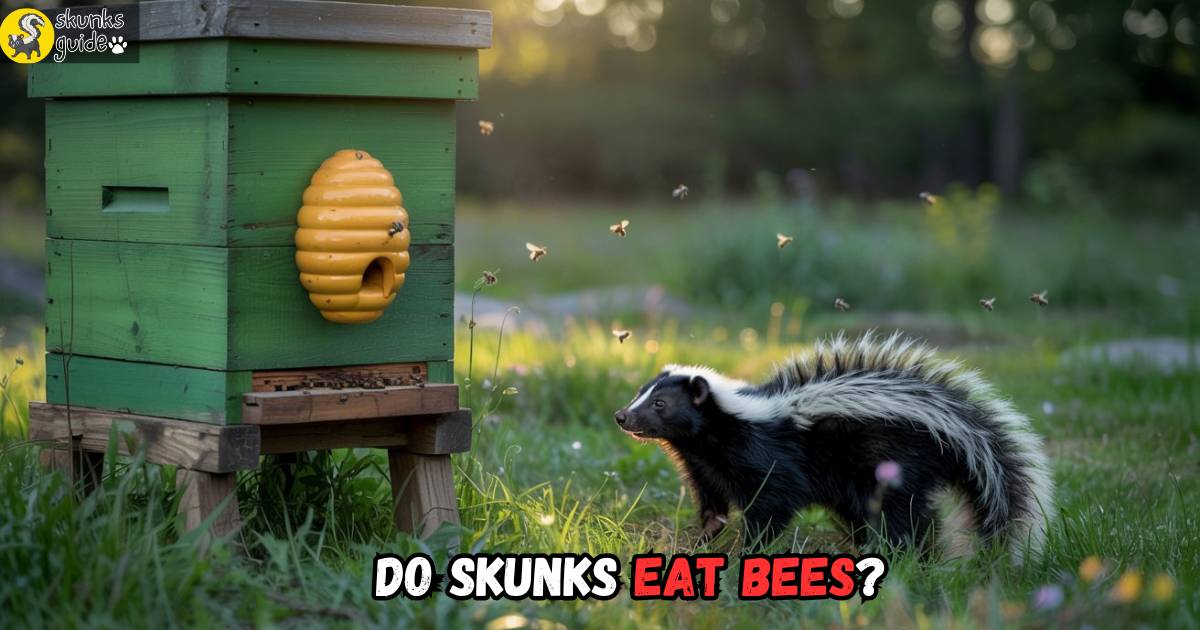Do Skunks Eat Bees?
Last updated on June 26th, 2025 at 12:48 am
As the proud owner of four delightful pet skunks, I’ve learned a lot about their quirky eating habits. Skunks are known for their bold black-and-white fur and potent spray, but did you know they also eat bees? Yes, skunks are opportunistic omnivores that raid beehives to feast on bees and their protein-rich larvae. While this can be a headache for beekeepers, it’s a fascinating part of their role in nature. In this guide, I’ll share insights from my experience and research to answer, “Do skunks eat bees?” and explore how this behavior impacts ecosystems and beekeeping.
Do Skunks Eat Bees? The Basics
Skunks absolutely eat bees! Their omnivorous diet makes them versatile feeders, and beehives are an attractive target. My skunks have shown a particular fondness for insects, so it’s no surprise they’d go after bees in the wild. Here’s what skunks typically eat:
- Insects: Bees, beetles, crickets, grasshoppers, and grubs.
- Small Mammals: Mice, voles, and shrews.
- Fruits and Nuts: Berries, apples, and acorns.
- Eggs and Reptiles: Bird eggs, frogs, and lizards.
- Carrion: Dead animals scavenged for easy meals.
Bees aren’t a daily staple, but they become a go-to when hives are accessible or other prey is scarce.
Why Skunks Target Bees and Bee Nests
From watching my skunks sniff out insects in our backyard, I can see why bees and their nests are so appealing. Here’s why skunks eat bees:
- Protein-Rich Larvae: Do skunks eat bees nests? Yes, skunks target bee nests for their nutrient-dense larvae, which are packed with protein to fuel their energy needs.
- Seasonal Availability: Skunks raid hives and nests in spring and summer when bees are active, helping them build fat reserves for winter.
- Easy Prey: Can skunks eat bees? Definitely! Their thick fur shields them from most bee and wasp stings, allowing them to swat and eat insects with ease.
Do skunks eat honeybees? Honeybees are a prime target due to their abundant larvae and accessible hives. Do skunks eat ground bees? Yes, skunks will dig up ground bee nests, especially in open areas.
How Skunks Raid Beehives

Nighttime Foraging
Skunks are nocturnal hunters, which gives them an advantage over bees that are less active at night. This reduces the risk of encountering swarming bees.
Hive Scratching
Skunks often scratch at the entrance of beehives to provoke bees to come out. Once the bees emerge, skunks swat them out of the air and eat them.
Thick Fur Defense
A skunk’s thick fur acts as natural armor, protecting it from the majority of bee stings. However, sensitive areas like the nose or eyes may still be at risk.

Impact on Beekeeping
Skunk raids can be a real challenge for beekeepers. I’ve spoken with local beekeepers who’ve dealt with skunks weakening their hives, affecting honey production and pollination. Signs of skunk activity include:
- Scratches around hive entrances.
- Bee carcasses scattered near hives.
- Reduced hive activity or declining bee populations.
Protecting Hives from Skunks
To keep skunks at bay, beekeepers can try these methods:
- Repellents: Use natural or commercial skunk repellents around hives.
- Hive Stands: Elevate hives 18–24 inches off the ground to make access harder.
- Barriers: Install skunk-proof fencing around apiaries.
- Motion-Activated Lights: Skunks shy away from bright lights, so these can deter nighttime visits.
Skunks and Bees: An Ecological Perspective
Skunks eating bees is part of nature’s balance. As a skunk owner, I appreciate their role in controlling insect populations, even if it means occasional conflicts with beekeepers. Here’s the bigger picture:
- Predator-Prey Dynamics: Skunks help regulate insect populations, including bees, contributing to ecological balance.
- Minimal Impact on Bees: Healthy bee colonies can usually withstand occasional skunk predation. However, repeated raids can stress weaker hives, especially in areas with declining bee populations.
Frequently Asked Questions
Skunks and Bees: An Ecological Perspective
Frequently Asked Questions
Yes, but their thick fur minimizes the impact of stings. Sensitive areas like the nose or face are more vulnerable.
Mostly, yes. Skunks are nocturnal and prefer raiding hives at night when bees are less active.
Occasional skunk activity is unlikely to harm healthy hives, but repeated attacks can weaken bee colonies, making them vulnerable to other threats.
Conclusion
Skunks eating bees is a fascinating example of nature’s complexity. While this behavior can be problematic for beekeepers, it showcases the skunk’s adaptability and role as an omnivorous predator. Understanding this dynamic allows us to appreciate skunks’ contributions to the ecosystem while finding ways to minimize conflicts with human activities, such as beekeeping. With thoughtful management, we can coexist with these intriguing creatures and protect our vital pollinators.

